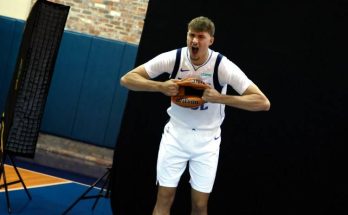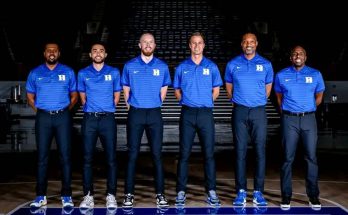You think you know who runs the NBA next? Think again. 👀 Cooper Flagg’s takeover just started, and the basketball world is only beginning to understand what that really means. The league has seen prodigies before—LeBron, Luka, Wemby—but what’s unfolding with Flagg feels different. It’s not just about stats, highlight reels, or hype; it’s about a mentality, a shift in gravity, the kind of presence that makes veterans uneasy and fans giddy. For years, whispers surrounded his name: the next great thing out of Maine, a high school phenom built like a superhero with the poise of a ten-year vet. But nobody truly grasped how fast he’d make good on the prophecy.
From the moment Cooper Flagg declared for Duke, the expectations were suffocating. Every step, every game, every quote was dissected like sacred text. Yet he handled it all with an eerie calm, a quiet confidence that bordered on unsettling for opponents. He was never just trying to fit in—he was plotting dominance. College basketball didn’t feel like a stop on the way to something bigger; it felt like a scrimmage. His defensive timing was absurd, his energy unrelenting. Coaches called him “the best practice player I’ve ever seen.” Scouts said he was the rare blend of raw power and surgical precision. But it wasn’t just the physical. Flagg carried himself with that unmistakable aura—the kind that makes teammates believe and critics hesitate.
The NBA draft was supposed to be a formality. Everyone knew he’d go number one, but the weight of that pick often crushes young players. Not him. From the moment his name was called, Cooper Flagg looked like he’d been waiting his whole life to prove the world’s expectations weren’t high enough. The handshake with the commissioner barely broke his composure. Reporters looked for nerves; they found steel. The league’s future had arrived, not with fanfare, but with focus. You could feel it in the room—a subtle shift, a collective understanding that something new had entered the ecosystem.
Then came Summer League. Most rookies treat it like an orientation, a chance to learn the pace and rhythm of the pro game. Flagg treated it like a warning shot. Game after game, he torched defenders who were supposed to be fighting for roster spots, not highlight reels. He didn’t just score—he dictated the energy of the floor. The crowd buzzed every time he touched the ball, waiting for something spectacular, and most of the time, he delivered. One chase-down block turned into a viral clip. A step-back three drew comparisons to prime Durant. But beyond the highlights, there was something else—an intensity that separated him from other young stars. He played every possession like it meant something cosmic.
By the time the regular season tipped off, fans weren’t asking whether he’d be good; they were asking how fast he’d be great. And the answer came almost instantly. In his first month, Flagg was already putting up numbers that didn’t make sense for a teenager. Double-doubles, game-winning plays, defensive masterclasses against seasoned scorers. He wasn’t supposed to understand rotations like that. He wasn’t supposed to read double-teams and make pinpoint passes like that. But there he was, doing it all with the calm of a player ten years older. His coaches kept saying it—he sees the game in slow motion. It’s like he’s two steps ahead of everyone else.
What really started to turn heads wasn’t just the talent—it was the control. You rarely see rookies command the tempo of a game. Most are reactive, trying to keep up. Flagg dictated everything: when to push, when to pull back, when to strike. Teammates started deferring to him naturally. The veterans, the guys who’d been around the league, began letting him take the lead in crunch time. And that’s when the takeover started to feel real. There’s a difference between being the best player on your team and being the one everyone listens to. Cooper Flagg, barely out of his teens, already had that hold.
Social media exploded. Every night, he trended. Every performance felt like an episode in a saga. Fans began saying it half-jokingly at first—“Flagg runs the league”—but as the season unfolded, it stopped being a joke. The numbers piled up, the moments stacked higher. A 40-point night against an MVP candidate. A game-saving block on a national stage. The rookie records started falling one by one. What used to belong to LeBron or Durant now had his name beside it. But even with all the hype, Flagg never leaned into it. No flashy quotes, no big declarations. Just a steady rhythm of excellence that made you wonder how far this could go.
The league’s old guard took notice. Players who’d once been the face of the NBA suddenly found themselves studying him. “He’s got that thing,” one All-Star said after being held to 12 points in a loss. “You can’t explain it—you just feel it when he’s on the court.” And that was the thing about Flagg: you didn’t just see his impact, you felt it. His defense suffocated teams. His rebounding sparked fast breaks. His vision turned average possessions into art. Every time he stepped onto the floor, the entire atmosphere changed. That’s what separates stars from rulers—stars entertain; rulers redefine the game.
By midseason, the media narrative shifted completely. The question wasn’t whether he’d win Rookie of the Year; it was whether he’d make the All-Star team outright. And when he did, the symbolism was undeniable. The youngest All-Star starter in years, walking into the locker room surrounded by names that built the last decade of basketball, and yet it didn’t look out of place. He was one of them already. During the All-Star Game, he wasn’t there to soak in the experience—he was there to compete. Midway through the second quarter, he blocked a reigning MVP’s dunk attempt, jogged downcourt, and hit a pull-up three on the other end. The crowd erupted. The message was loud: the torch isn’t being passed; it’s being taken.
Off the court, Flagg’s influence spread just as fast. Brands wanted him. Kids mimicked his routines. The calm demeanor, the focus, the relentless work ethic—it all felt authentic. He wasn’t trying to be a celebrity; he was trying to be a standard. And that’s what made his rise so magnetic. The NBA has had flashy stars and villains, icons and anomalies, but what it’s rarely had is someone who combines the humility of a grinder with the dominance of a generational talent. Every quote from him sounded like a mission statement. Every action backed it up.
As the playoffs loomed, the whispers turned into debates. Could a rookie actually lead a team deep into the postseason? Logic said no. History said no. But Flagg had been rewriting both all year. In his first playoff series, he didn’t flinch. He played with the same composure, the same fire. Every possession was a lesson in anticipation. Game after game, he elevated his teammates, outthought defenders, and made it clear that pressure didn’t touch him—it fueled him. And when his team advanced further than anyone expected, the narrative became inevitable: Cooper Flagg wasn’t just the future. He was the present.
But the thing about a takeover is that it’s never just about dominance—it’s about inevitability. You watch him play, and you realize he’s not forcing anything. The greatness feels natural, like gravity. He doesn’t need to shout it or sell it; he just is. Every new matchup, every test, he adapts. The flaws people pointed out early—shot consistency, playmaking under pressure—are shrinking by the week. He studies. He adjusts. He grows in real time. And that’s what terrifies opponents most: he’s still getting better.
The comparisons are endless—LeBron’s IQ, Durant’s shooting, Kawhi’s defense, Tatum’s polish—but Flagg seems uninterested in being anyone else. He’s carving out his own archetype, a blend of old-school fundamentals and new-age fearlessness. He’s part of a generation raised on highlights but rooted in substance. Watching him, you get the feeling you’re seeing the next decade of basketball take shape right before your eyes. The style, the swagger, the substance—all orbit around him now.
The NBA has always been a league built on eras: Magic and Bird, Jordan, Kobe, LeBron. Each one defined not just a player, but a cultural identity. And right now, as the torch quietly shifts, it’s clear whose hands it’s falling into. The Cooper Flagg era isn’t something you predict—it’s something you witness. The balance of power is changing, the energy of the game is changing, and it’s all centered around a 19-year-old who doesn’t seem fazed by any of it. The question used to be who’s next. Now, it’s how far he’ll go.
So when you hear someone say they know who runs the NBA next, tell them to think again. The league doesn’t just belong to its stars anymore—it belongs to its forces of nature. Cooper Flagg isn’t just joining the conversation; he’s rewriting the language. His takeover isn’t loud or brash; it’s inevitable, efficient, complete. The kind of rise you don’t see coming until it’s already happened. The kind that reminds you why basketball, at its best, feels like destiny unfolding in real time. And if this is just the beginning, then the NBA’s future isn’t just bright—it’s inevitable, and it wears number 32.


